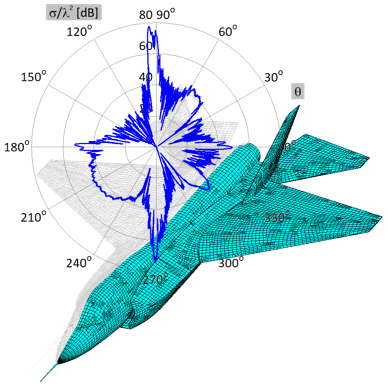Monostatic RCS of Fighter Aircraft
11-Sep-2013

11-Sep-2013
 Especially important when simulating Radar Cross Section (RCS) of an airplane or a similar target, WIPL-D suite offers a great set of tools for full wave EM simulation of real life geometries at high frequencies. WIPL-D Pro CAD enables import of extremely complex geometries from all popular CAD files (such as models created in tools specialized for mechanical engineering), validation of models, and easy simplification of details obsolete for EM simulation (such as metallic screws).
Especially important when simulating Radar Cross Section (RCS) of an airplane or a similar target, WIPL-D suite offers a great set of tools for full wave EM simulation of real life geometries at high frequencies. WIPL-D Pro CAD enables import of extremely complex geometries from all popular CAD files (such as models created in tools specialized for mechanical engineering), validation of models, and easy simplification of details obsolete for EM simulation (such as metallic screws).
The in-house developed mesher performs subdivision of complex geometries into generalized quadrilaterals. The meshing is automated and extremely efficient to allow precise modeling of details, curvatures and small features while the requirements for EM simulation are kept as minimal as possible.
After a proper quad mesh is created, WIPL-D Pro allows EM simulation in most efficient manner available among commercial tools (quad mesh, unique higher order basis functions, 30 unknown coefficients per lambda square for metallic surfaces, many features to further decrease number of unknowns but preserve the accuracy, very efficient CPU and GPU simulation on inexpensive hardware platforms, WIPL-D support team has years of experience in simulation of complex EM problems). The simulations include high resolution of monostatic RCS (F16 from 0.1 to 3 GHz, F35 from 0.1 to 4 GHz, F35 at 10 GHz by using DDS Solver), on multicore and multi GPU workstation, with simulation time measured in hours.
Section: RCS/Scattering
For full version of the document, please check the following pdf.